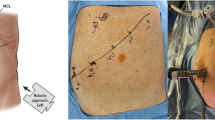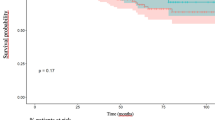Abstract
Purpose of Review
This review aims to clarify the current role of minimally invasive surgery in the treatment of rectal cancer, highlighting short- and long-term outcomes from the latest trials and studies.
Recent Findings
Data from previous trials has been conflicting, with some failing to demonstrate non-inferiority of laparoscopic surgical resection of rectal cancer compared to an open approach and others demonstrating similar clinical outcomes. Robot-assisted surgery was thought to be a promising solution to the challenges faced by laparoscopic surgery, and even though the only randomized controlled trial to date comparing these two techniques did not show superiority of robot-assisted surgery over laparoscopy, more recent retrospective data suggests a statistically significant higher negative circumferential resection margin rate, decreased frequency of conversion to open, and less sexual and urinary complications.
Summary
Minimally invasive surgery techniques for resection of rectal cancer, particularly robot-assisted, offer clear short-term peri-operative benefits over an open approach; however, current data has yet to display non-inferiority in terms of oncological outcomes.
Similar content being viewed by others
References
Siegel RL, Miller KD, Jemal A. Cancer statistics, 2018. CA Cancer J Clin. 2018;68:7–30. https://doi.org/10.3322/caac.21442.
Green BL, Marshall HC, Collinson F, Quirke P, Guillou P, Jayne DG, et al. Long-term follow-up of the Medical Research Council CLASICC trial of conventional versus laparoscopically assisted resection in colorectal cancer. Br J Surg. 2013;100:75–82. https://doi.org/10.1002/bjs.8945.
Jeong SY, Park JW, Nam BH, Kim S, Kang SB, Lim SB, et al. Open versus laparoscopic surgery for mid-rectal or low-rectal cancer after neoadjuvant chemoradiotherapy (COREAN trial): survival outcomes of an open-label, non-inferiority, randomised controlled trial. Lancet Oncol. 2014;15:767–74. https://doi.org/10.1016/S1470-2045(14)70205-0.
van der Pas MHGM, Haglind E, Cuesta MA, Fürst A, Lacy AM, Hop WCJ, et al. Laparoscopic versus open surgery for rectal cancer (COLOR II): short-term outcomes of a randomised, phase 3 trial. Lancet Oncol. 2013;14:210–8. https://doi.org/10.1016/S1470-2045(13)70016-0.
Fleshman J, Branda M, Sargent DJ, Boller AM, George V, Abbas M, et al. Effect of laparoscopic-assisted resection vs open resection of stage II or III rectal cancer on pathologic outcomes the ACOSOG Z6051 randomized clinical trial. JAMA - J Am Med Assoc. 2015;314:1346–55. https://doi.org/10.1001/jama.2015.10529.
Stevenson ARL, Solomon MJ, Lumley JW, Hewett P, Clouston AD, Gebski VJ, et al. Effect of laparoscopic-assisted resection vs open resection on pathological outcomes in rectal cancer: the ALaCaRT randomized clinical trial. JAMA - J Am Med Assoc. 2015;314:1356–63. https://doi.org/10.1001/jama.2015.12009.
Weber PA, Merola S, Wasielewski A, Ballantyne GH, Delaney CP. Telerobotic-assisted laparoscopic right and sigmoid colectomies for benign disease. Dis Colon Rectum. 2002;45:1689–96. https://doi.org/10.1007/s10350-004-7261-2.
Hashizume M, Shimada M, Tomikawa M, Ikeda Y, Takahashi I, Abe R, et al. Early experiences of endoscopic procedures in general surgery assisted by a computer-enhanced surgical system. Surg Endosc Other Interv Tech. 2002;16:1187–91. https://doi.org/10.1007/s004640080154.
Jayne D, Pigazzi A, Marshall H, Croft J, Corrigan N, Copeland J, et al. Effect of robotic-assisted vs conventional laparoscopic surgery on risk of conversion to open laparotomy among patients undergoing resection for rectal cancer the rolarr randomized clinical trial. JAMA - J Am Med Assoc. 2017;318:1569–80. https://doi.org/10.1001/jama.2017.7219.
Liao G, Zhao Z, Lin S, Li R, Yuan Y, Du S, et al. Robotic-assisted versus laparoscopic colorectal surgery: a meta-analysis of four randomized controlled trials. World J Surg Oncol. 2014;12:122. https://doi.org/10.1186/1477-7819-12-122.
Li MZ, Bin XL, Wu WH, Bin YS, Li SZ. Meta-analysis of laparoscopic versus open colorectal surgery within fast-track perioperative care. Dis Colon Rectum. 2012. https://doi.org/10.1097/DCR.0b013e31824bd31e.
Guillou PJ, Quirke P, Thorpe H, Walker J, Jayne DG, Smith AMH, et al. Short-term endpoints of conventional versus laparoscopic-assisted surgery in patients with colorectal cancer (MRC CLASICC trial): multicentre, randomised controlled trial. Lancet. 2005;365:1718–26. https://doi.org/10.1016/S0140-6736(05)66545-2.
Kim JY, Kim NK, Lee KY, Hur H, Min BS, Kim JH. A comparative study of voiding and sexual function after total mesorectal excision with autonomic nerve preservation for rectal cancer: laparoscopic versus robotic surgery. Ann Surg Oncol. 2012;19:2485–93. https://doi.org/10.1245/s10434-012-2262-1.
Park SY, Choi GS, Park JS, Kim HJ, Ryuk JP, Yun SH. Urinary and erectile function in men after total mesorectal excision by laparoscopic or robot-assisted methods for the treatment of rectal cancer: a case-matched comparison. World J Surg. 2014;38:1834–42. https://doi.org/10.1007/s00268-013-2419-5.
Lee GC, Bordeianou LG, Francone TD, Blaszkowsky LS, Goldstone RN, Ricciardi R, et al. Superior pathologic and clinical outcomes after minimally invasive rectal cancer resection, compared to open resection. Surg Endosc. 2020;34:3435–48. https://doi.org/10.1007/s00464-019-07120-2.
Simillis C, Lal N, Thoukididou SN, Kontovounisios C, Smith JJ, Hompes R, et al. Open versus laparoscopic versus robotic versus transanal mesorectal excision for rectal cancer: a systematic review and network meta-analysis. Ann Surg. 2019;270:59–68. https://doi.org/10.1097/SLA.0000000000003227.
Bonjer HJ, Deijen CL, Abis GA, Cuesta MA, van der Pas MHGM, de Lange-de Klerk ESM, et al. A randomized trial of laparoscopic versus open surgery for rectal cancer. N Engl J Med. 2015;372:1324–32. https://doi.org/10.1056/nejmoa1414882.
Fleshman J, Branda ME, Sargent DJ, Boller AM, George VV, Abbas MA, et al. Disease-free survival and local recurrence for laparoscopic resection compared with open resection of stage ii to iii rectal cancer: follow-up results of the ACOSOG Z6051 randomized controlled trial. Ann Surg. 2019;269:589–95. https://doi.org/10.1097/SLA.0000000000003002.
Skancke M, Schoolfield C, Umapathi B, Amdur R, Brody F, Obias V. Minimally Invasive surgery for rectal adenocarcinoma shows promising outcomes compared to laparotomy, a National Cancer Database observational analysis. J Laparoendosc Adv Surg Tech. 2019;29:218–24. https://doi.org/10.1089/lap.2018.0471.
Kim NK, Aahn TW, Park JK, Lee KY, Lee WH, Sohn SK, et al. Assessment of sexual and voiding function after total mesorectal excision with pelvic autonomic nerve preservation in males with rectal cancer. Dis Colon Rectum. 2002;45:1178–85. https://doi.org/10.1007/s10350-004-6388-5.
Jayne DG, Brown JM, Thorpe H, Walker J, Quirke P, Guillou PJ. Bladder and sexual function following resection for rectal cancer in a randomized clinical trial of laparoscopic versus open technique. Br J Surg. 2005;92:1124–32. https://doi.org/10.1002/bjs.4989.
Luca F, Valvo M, Ghezzi TL, Zuccaro M, Cenciarelli S, Trovato C, et al. Impact of robotic surgery on sexual and urinary functions after fully robotic nerve-sparing total mesorectal excision for rectal cancer. Ann Surg. 2013;257:672–8. https://doi.org/10.1097/SLA.0b013e318269d03b.
A comparison of laparoscopically assisted and open colectomy for colon cancer. N Engl J Med 2004. doi:https://doi.org/10.1056/nejmoa032651.
Zerey M, Hawver LM, Awad Z, Stefanidis D, Richardson W, Fanelli RD. SAGES evidence-based guidelines for the laparoscopic resection of curable colon and rectal cancer. Surg Endosc. 2013;27:1–10. https://doi.org/10.1007/s00464-012-2592-x.
Park IJ, Choi GS, Lim KH, Kang BM, Jun SH. Multidimensional analysis of the learning curve for laparoscopic colorectal surgery: lessons from 1,000 cases of laparoscopic colorectal surgery. Surg Endosc Other Interv Tech. 2009;23:839–46. https://doi.org/10.1007/s00464-008-0259-4.
Li JCM, Hon SSF, Ng SSM, Lee JFY, Yiu RYC, Leung KL. The learning curve for laparoscopic colectomy: experience of a surgical fellow in an university colorectal unit. Surg Endosc. 2009;23:1603–8. https://doi.org/10.1007/s00464-009-0497-0.
Akiyoshi T, Kuroyanagi H, Ueno M, Oya M, Fujimoto Y, Konishi T, et al. Learning curve for standardized laparoscopic surgery for colorectal cancer under supervision: a single-center experience. Surg Endosc. 2011;25:1409–14. https://doi.org/10.1007/s00464-010-1404-4.
Son GM, Kim JG, Lee JC, Suh YJ, Cho HM, Lee YS, et al. Multidimensional analysis of the learning curve for laparoscopic rectal cancer surgery. J Laparoendosc Adv Surg Tech. 2010;20:609–17. https://doi.org/10.1089/lap.2010.0007.
Park IJ, Choi GS, Lim KH, Kang BM, Jun SH. Multidimensional analysis of the learning curve for laparoscopic resection in rectal cancer. J Gastrointest Surg. 2009;13:275–81. https://doi.org/10.1007/s11605-008-0722-5.
Kayano H, Okuda J, Tanaka K, Kondo K, Tanigawa N. Evaluation of the learning curve in laparoscopic low anterior resection for rectal cancer. Surg Endosc. 2011;25:2972–9. https://doi.org/10.1007/s00464-011-1655-8.
Jonker FHW, Hagemans JAW, Verhoef C, Burger JWA. The impact of hospital volume on perioperative outcomes of rectal cancer. Eur J Surg Oncol. 2017;43:1894–900. https://doi.org/10.1016/j.ejso.2017.07.009.
Yamaguchi T, Kinugasa Y, Shiomi A, Sato S, Yamakawa Y, Kagawa H, et al. Learning curve for robotic-assisted surgery for rectal cancer: use of the cumulative sum method. Surg Endosc. 2015;29:1679–85. https://doi.org/10.1007/s00464-014-3855-5.
Aghayeva A, Baca B. Robotic sphincter saving rectal cancer surgery: a learning curve analysis. Int J Med Robot Comput Assist Surg. 2020;16:e2112. https://doi.org/10.1002/rcs.2112.
Foo CC, Law WL. The learning curve of robotic-assisted low rectal resection of a novice rectal surgeon. World J Surg. 2016;40:456–62. https://doi.org/10.1007/s00268-015-3251-x.
Kim YW, Lee HM, Kim NK, Min BS, Lee KY. The learning curve for robot-assisted total mesorectal excision for rectal cancer. Surg Laparosc Endosc Percutaneous Tech. 2012;22:400–5. https://doi.org/10.1097/SLE.0b013e3182622c2d.
Bolger JC, Broe MP, Zarog MA, Looney A, McKevitt K, Walsh D, et al. Initial experience with a dual-console robotic-assisted platform for training in colorectal surgery. Tech Coloproctol. 2017;21:721–7. https://doi.org/10.1007/s10151-017-1687-8.
Ramji KM, Cleghorn MC, Josse JM, MacNeill A, O’Brien C, Urbach D, et al. Comparison of clinical and economic outcomes between robotic, laparoscopic, and open rectal cancer surgery: early experience at a tertiary care center. Surg Endosc. 2016;30:1337–43. https://doi.org/10.1007/s00464-015-4390-8.
Keller DS, Senagore AJ, Lawrence JK, Champagne BJ, Delaney CP. Comparative effectiveness of laparoscopic versus robot-assisted colorectal resection. Surg Endosc. 2014;28:212–21. https://doi.org/10.1007/s00464-013-3163-5.
Silva-Velazco J, Dietz DW, Stocchi L, Costedio M, Gorgun E, Kalady MF, et al. Considering value in rectal cancer surgery: an analysis of costs and outcomes based on the open, laparoscopic, and robotic approach for proctectomy. Ann Surg. 2017;265:960–8. https://doi.org/10.1097/SLA.0000000000001815.
Park JS, Choi GS, Park SY, Kim HJ, Ryuk JP. Randomized clinical trial of robot-assisted versus standard laparoscopic right colectomy. Br J Surg. 2012;99:1219–26. https://doi.org/10.1002/bjs.8841.
Justiniano CF, Becerra AZ, Xu Z, Aquina CT, Boodry CI, Schymura MJ, et al. A population-based study of 90-day hospital cost and utilization associated with robotic surgery in colon and rectal cancer. J Surg Res. 2020;245:136–44. https://doi.org/10.1016/j.jss.2019.07.052.
Author information
Authors and Affiliations
Contributions
Leonardo E. Garcia: literature review, drafting article; James Taylor: literature review, revision of article; Chady Atallah: critical revision of the article, approval of article
Corresponding author
Ethics declarations
Conflict of Interest
The authors declare no competing interests.
Additional information
Publisher’s Note
Springer Nature remains neutral with regard to jurisdictional claims in published maps and institutional affiliations.
This article is part of the Topical Collection on Gastrointestinal Cancers
Rights and permissions
About this article
Cite this article
Garcia, L.E., Taylor, J. & Atallah, C. Update on Minimally Invasive Surgical Approaches for Rectal Cancer. Curr Oncol Rep 23, 117 (2021). https://doi.org/10.1007/s11912-021-01110-1
Accepted:
Published:
DOI: https://doi.org/10.1007/s11912-021-01110-1




